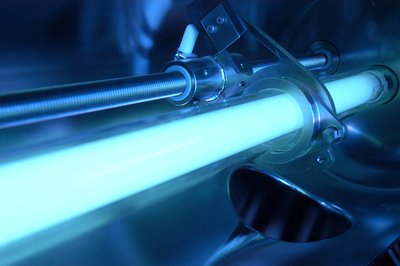Korean brewery sees the light
As part of its environmentally conscious approach to brewing, Korea’s Hite Brewery Company recently installed 25 Hanovia UV water disinfection systems at its Massan and Gangwan plants. The UV systems ensure water used in the production processes remains free from microbial contamination, ensuring a high-quality final product. Seven units are installed at Massan and 18 at Gangwan.
In Massan, the UV is used to treat clean-in-place (CIP) water, cooling water injected after the CIP and activated carbon-filtered water. At the Gangwan plant, three UV units are used to treat water after deaeration and the remaining 15 units treat activated carbon-filtered water.

CIP is used for cleaning the interior surfaces of pipework, vessels, filters and other process equipment. CIP water must be completely free from microbial contamination, otherwise it could infect the whole system. As CIP uses very hot water, pipework and vessels need to be cooled down afterwards and before beer production can recommence. Cooling water also helps flushes out the remaining CIP water, which contains acid and caustic soda. The purity of the cooling water is therefore extremely important to prevent any residual contamination.
Activated carbon is commonly used in water treatment for decolouring and deodorisation, due to its strong adsorption properties. This adsorption can also remove residual chlorine from the water, leaving the post-filter water vulnerable to microbial contamination. UV therefore plays a vital role in ensuring the post-filter water is adequately disinfected.
Deaeration removes dissolved oxygen from water prior to the addition of yeast, a key part of the brewing process. Any contamination of the deaeration water could kill the yeast, meaning the whole batch would have to be destroyed. UV is ideal for this step as it is quick acting and effective without producing any unwanted disinfection by-products which could affect the yeast.
“When Hite was considering UV for the first time it looked at a number of UV system suppliers,” said Ying Xu, Hanovia’s Asia-Pacific Sales Manager. “Hanovia was selected as our UV systems not only produced the highest microbial reduction rates, but we also offer a comprehensive and cost-effective spare parts and maintenance service. Hite now uses over 45 Hanovia UV systems in its breweries across Korea, including the latest project at Massan and Gangwan.”
“According to the company it also needs to do CIP less frequently, it uses less preservative in the finished product, and the final water has no unwanted residuals, so the taste and colour is not altered in any way. This all adds up to a cleaner, greener process and product,” she added.
For manufacturers seeking to improve the quality of the end product, Hanovia says UV is an economic, realistic option. It is an established method of disinfecting drinking water throughout the world, and is also widely used for high-purity applications such as pharmaceutical processing and microchip manufacturing, where water of the highest quality is essential.
There are no microorganisms known to be resistant to UV - this includes pathogenic bacteria such as Listeria, Legionella and Cryptosporidium (and its spores, which are resistant to chlorination).
UV disinfection systems are also easy to install, Hanovia says, with minimum disruption to the plant. They need very little maintenance, the only requirement being replacement of the UV lamps every 9-12 months, depending on use. This is a simple operation that takes only a few minutes and can be carried out by general maintenance staff.
Aranet supermarket temperature monitoring solution
Temperature monitoring for supermarkets is extremely important, but gathering data can be a...
Hygienic design for food production automation systems
Integrated Automation Limited (IAL) has set a new benchmark in food production by standardising...
Aussie-built AI aims to solve disconnect issues for food manufacturers
An Australian-built AI solution designed to break down communication blocks between manufacturing...














